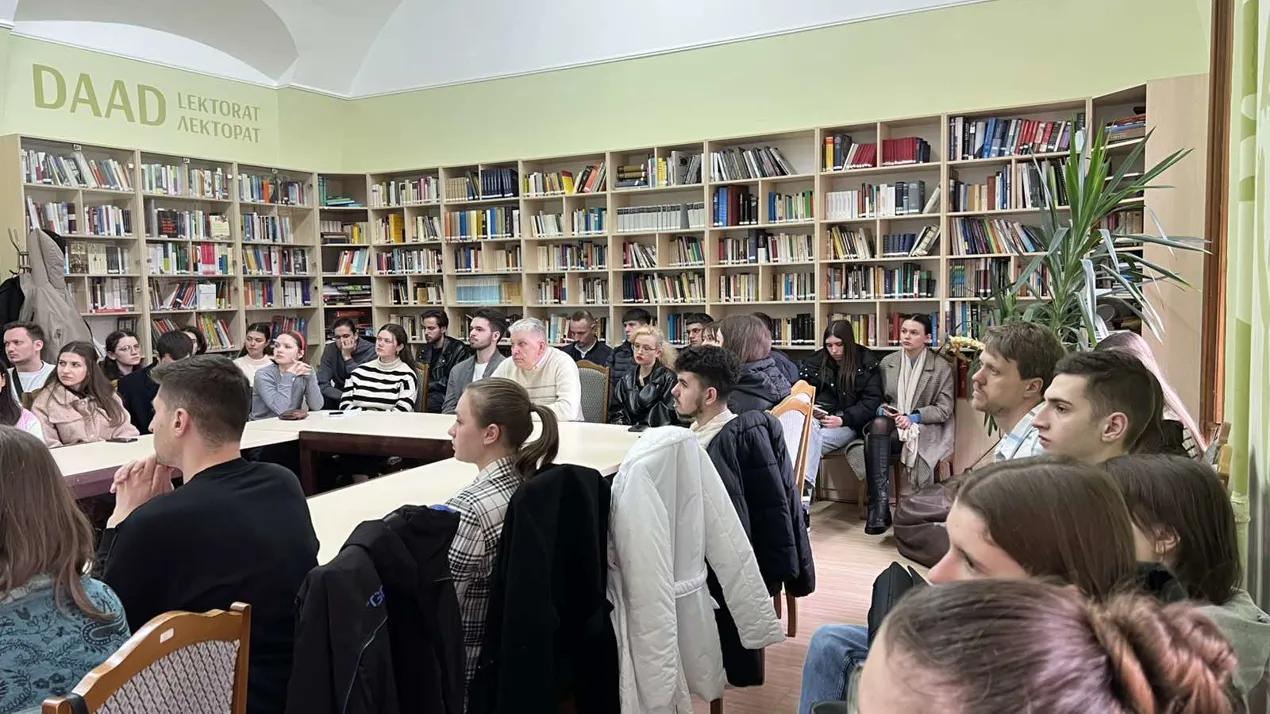
- середа, 2 квітня 2025 р.
- Кафедра міжнародних відносин та суспільних комунікацій
1 квітня 2025 р. Відділом міжнародних зв’язків Чернівецького національного університету ім. Юрія Федьковича була організована чергова цікава зустріч з нашими закордонними партнерами.
Цього разу з гостьовою лекціє до нас завітали німецькі партнери. З цікавою лекціє перед студентами-міжнародниками та істориками виступив доктор Давор Беганович з Інституту славістики Мюнстерського університету (Німеччина). Він прочитав лекцію англійською мовою на надзвичайно актуальну темe «Bosnia and Hercegovina – the Land of Mixing and Dividing».
Студенти з великою цікавістю слухали лектора. Про свідчить і та кількість питань, які отримав Давор Беганович.
З приємністю хочеться відмітити високій рівень знання іноземних мов нашими студентами. До речі питання задавались як німецькою, так і англійською мовами. Зокрема Богдан Москалюк (гр. 305), Голова студентського наукового товариства «Меридіан» вільно дискутував з нашим гостем німецькою мовою. Власенко Володимир, Беляєва Дарія, 3-й курс та Богдан Девятко, 1-й курс задавали цікаві питання англійською мовою.
Безумовно, такого типу спілкування студентів з науковцями з наших партнерських університетів, сприяє значному якісному покращенню рівня знань студентів.
Дякуємо Відділу міжнародних зв’язків ЧНУ за такі зустрічі та гостьові лекції.
Bosnia and Hercegovina – the Land of Mixing and Dividing
Bosnia and Hercegovina is a land of difficult history. From the beginning it was a field of crashing of great powers that tried to win the overhand upon its rich natural resources and take control of its strategically important geographic location. Bosnia is the crossroad from East and West as well as from Nord and South. In a long way of history local population was established as mostly Slavic, the foreigners trying to gain the control were mostly Hungarian and Franks. The relative stability from 12th to 15th resulted in creation of kingdom that was in a sense religiously independent too. Autochthonous Church of Bosnia was a schismatic institution, under the protection of Bosnian kings who, at last, couldn’t stand a double pressure from Hungary and Rome and let it fall, translating Bosnia in a purely catholic land. The consequence of this development was the installation of Franciscan order, who fought against schismatics, as the bearer of catholic religion and the driving force in the process of conversion. At the end of 14th century one break in Bosnian history started to take shape. The Ottoman raids endangered the Bosnian kingdom and eventually led to its fall. It happened in 1463 and the only institution that was allowed to exercise Christian religion were precisely the Franciscans, who kept the culture of catholic folk vivid. This situation lasted until the next great break in the Bosnian history, the occupation (1878) followed by the annexation (1908) of the land by Habsburg monarchy. These are the facts connecting Bosnia and Bukovina in more than analogy. In a sense both are borderlands, finding themselves on the dividing line between different civilizations, moreover, building that division themselves, incorporating and constructing it. That fact could be seen as a cliché, if there weren’t another moments showing that there is more than grain of truth in it. At the first place is their multiculturality because of long historically mixture of different folks brought on their territory. In the long history of Ottoman rule Bosnian society was strictly divided on the line of three different religions: Muslim, Catholic and Eastern Orthodox. From the end of 15th century, it comes the fourth one – Sephardic Jews which were expelled from Spain in the wake of Reconquista. This coexistence in division remained undisputed until the end of 19th century. With Habsburg rule Bosnia was floated with diverse members of Middle European nations who were hired by government in order to change and modernize the administration structure. These changes led to cultural modernization and development in the school system that slowly but systematically made Bosnia a European land: staying on the margins but still participating in the mainstream continental developments. The end of WWI that started in Bosnia meant retreat of Austrian-Hungarian monarchy and takeover of newly formed Kingdom of Serbs, Croats and Slovenes which was later to become Kingdom of Yugoslavia. Bosnia become definitively a Slavic land. That doesn’t mean that this political development brought significant changes for better. On the contrary interwar period meant stalemate, in every sense of the word, economically, politically, even the culture suffered. WWII was the harsh time for Bosnia. Some of the major battles were led there, some of the greatest war crimes were perpetrated there, mostly between the Bosnian nations themselves. The victory of the communist led partisans was followed by a period of strong industrialization and, from the Sixties on, liberation in the field of politics and culture. At the same time as a crucial factor came the recognition of Muslims as a nation. Now there were three equal entities that should share the political and cultural power between themselves. The period from the beginning of the Seventies to middle of Eighties can be seen as a time of prosperity culminating in the organization of Winter Olympic Games in Sarajevo in 1984. What followed was a decline caused by economy crises and mounting tension between the grounding nations, not only in Bosnia but in the whole of Yugoslavia. The last act of break up of the country was the horrible war that only in Bosnia took some 110000 lives and lasted for more than three years. It ended in volatile peace, which was the result of compromise between warring parties, accomplished under enormous pressure of the USA.
In my lecture I will pay special attention to this last period of Bosnian history and draw the parallel between the destiny of my land and Ukraine. There are so many similarities between the two, that my duty is to point them out, without trying to give any advice how Ukraine should act in future in order to gain the freedom on the complete territory. But its victory against imperialism would be great stimulus and encouragement for all the “small people” fighting for their liberty and right to be free and independent.

